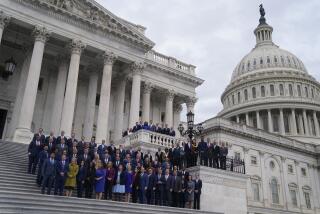The Holiday Spirit in Voices of Freedom : New Americans: Three recently naturalized citizens find better lives in their new homeland.
This Independence Day marks the first time that Som Prum, Mirmohammad Kabir Rafiq and Roy A. Byron-Cooper will celebrate the Fourth of July as Americans.
The three Ventura County residents, sworn in as citizens in November, took different paths to the United States, drawn by a promise of freedom denied in their native countries.
Each has prospered in his own way, and each recognizes the debt that Americans owe to the signers of the document that today’s holiday honors.
“The right to life, liberty and the pursuit of happiness is de facto, and it does work,” said Byron-Cooper, 58, a native Rhodesian who lives in Ventura. “That’s what everyone wants.”
“The freedom of speech or of writing whatever I want I never had before,” said Prum, 38, a native of Cambodia.
Prum came to California in 1980 by way of Thailand. He fled his homeland after four years in a forced labor camp run by the Khmer Rouge, the brutal Communist regime that controlled most of Cambodia from 1975 to 1979.
“I saw so many people get killed and die of starvation,” said Prum, who escaped the repression with his wife and children by sneaking through the jungle to a Thai refugee camp. “When we came to the United States, I felt so strange in my body and in my mind. I felt like we went to heaven.”
Rafiq fled Afghanistan--and certain imprisonment or death for having been a U. S. Embassy employee--20 days before the Soviet invasion in 1979. Now the owner of a Simi Valley telephone-systems company, he and his wife arrived in the United States with $200 and their first child on the way.
“My life was in jeopardy because the police were watching me all the time,” said Rafiq, 40, who managed the embassy’s storage warehouse. “If you are in a situation where you can’t walk free, then you don’t know the value of freedom. If you don’t have freedom, you have nothing.
“When you are born free, you forget that your fathers and their fathers before them gave their blood for the freedom you have now,” Rafiq said. “People go to see the fireworks but don’t remember what the fireworks are for.”
Byron-Cooper made a temporary home in Israel in 1973 after realizing that the white-minority government in his homeland, now Zimbabwe, was morally bankrupt and doomed to fall. Black nationalists ultimately took over the southeast African country in 1980 after a 14-year guerrilla war.
“There were so many troubles there I had to get out,” said Byron-Cooper, who, as a Jew, immigrated to Israel under the “right of return” doctrine before coming to the United States in 1976. “The United Nations said it was a white supremacist government, which was true, and the inequities were too unreconcilable.”
“Things here aren’t right as far as racial equity is concerned, but there are mechanisms of change here that there weren’t in Rhodesia,” he said. “There were many people who disagreed with the concept of white supremacist government, and that’s the reason why you left.”
Having gained the right to vote with his U. S. citizenship, Byron-Cooper is troubled that more Americans do not exercise the freedom to elect their leaders.
“Voter turnouts are terrible here,” said Byron-Cooper, who worked on NATO projects in Rhodesia and now is a safety engineer for the state of California. “When things are not going quite right, you have people who begin blaming who’s ever in power, then you come to find they never voted in the first instance.
“You’re given the power to change things, but it will only be there as long as people use it,” he said. “It is a most precious thing.”
Rafiq said he is disturbed by how many Americans, particularly the younger ones, take their freedoms for granted, and stretch them to excess.
“I can go out and take some drugs, but that is not freedom; that is abusing it and interpreting it in the wrong way,” Rafiq said. “It’s the same thing with guns. People feel free to carry them around with them, and that’s why people are getting killed.”
Prum, whose unsolicited letter to the U. S. Embassy in Bangkok from the Thai refugee camp gained him a visa, is grateful for the opportunities available to his four children. His daughter, Phyrum Gabrielle, 17, was sworn in as a citizen with him and just became the first in his family to graduate from high school.
“Even the poor people here can still have a car and a television, when the poor in Cambodia can’t afford a bicycle,” said Prum, who is shipping manager for a Ventura company. “I wanted to build a good life and find a future for my children. Over here, we’ve had the chance.”
More to Read
Sign up for Essential California
The most important California stories and recommendations in your inbox every morning.
You may occasionally receive promotional content from the Los Angeles Times.










